Jim Fairles DVM, MBA; Josie Given Updated January 2022
Laboratory Services protects client confidentiality with the utmost care and does not release any client information or results into the public domain. Should we be compelled by law or regulations, we will share specific information with regulators when applicable; e.g. notifiable diseases.
Only a veterinarian or a veterinary researcher or an agent acting on their behalf can submit samples to the AHL. We do not provide services for the general public. Below is an overview of the submission process. To fast track to any step, click on it.
- Step 1: Collect the specimen(s)
- Step 2: Package the specimen(s)
- Step 3: Fill out the appropriate submission form
- Step 4: Package the specimen(s) for shipping
- Step 5: Send us the specimen(s) and submission form
Requests for AHL Project Contract Work
Clients who wish the AHL to perform project contract work, e.g., for large volumes, longer term research projects, etc., need to complete and return the Checklist for Requests for AHL Contract Work [1] prior to submitting any samples. This will allow the AHL to create a service quotation that can be agreed upon and signed by both parties. If this is a contract through your personal consulting company, we recommend that we jointly sign our Mutual Confidentiality & Non-Disclosure Agreement [2].
|
Step 1: Collect the specimen(s) you would like the AHL to test.
|
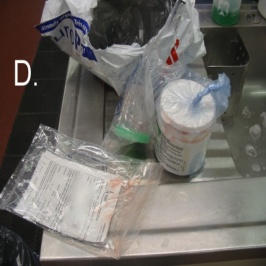 |
Step 2: Package the specimen(s)
|
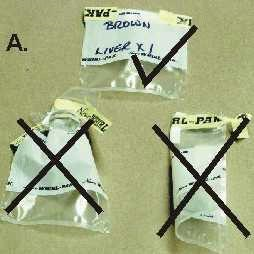 |
|
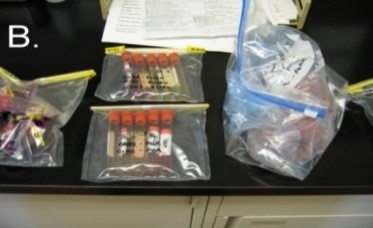 |
If you are in doubt about sample collection, please contact the laboratory at 519 824-4120 ext 54530 or ahlinfo@uoguelph.ca [5] |
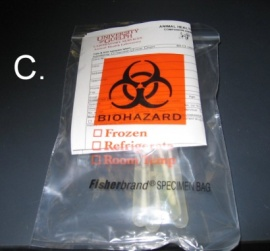 |
Step 3: Fill out the appropriate submission form
- Complete the appropriate submission form found on the ‘Submission Forms’ page of our website.
- To order customized submission forms, login to our ‘client access’ page or email ahlinfo@uoguelph.ca
- On the submission form include:
- Species, breed, age, sex, morbidity, mortality, treatment, etc. This information is essential for accurate diagnosis.
- Supply full name and address (including the postal code) for the clinic and producer for agricultural species.
- Please warn us if zoonotic diseases, e.g., rabies or salmonella, are suspected.
- Demographic information is important for surveillance and must be supplied in order to receive OMAFRA supported rates for testing of food/fiber-producing animals. Confidential information and identifiers are NOT used for surveillance – only the roll-up data are used.
- When submitting additional samples for follow-up, e.g., convalescent sera, please quote the original AHL lab number and clearly indicate that it is a follow-up sample.
Step 4: Prepare the specimen(s) for shipping
- Use mailing containers that meet standards for Transportation of Dangerous Goods, Type 1B packaging, i.e., watertight inner packaging surrounded by absorbent material, watertight secondary inner packaging and sturdy outer packaging (corrugated cardboard).
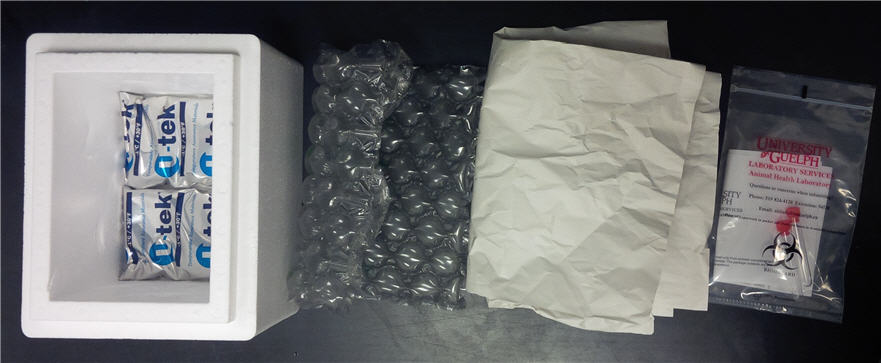
- Wrap frozen specimens in 5 to 6 layers of newspaper between gel type ice packs (no ice cubes).and place inside an insulated container.
- Consider extreme outside temperatures. Protect samples according to outside temperatures and sample requirements, e.g., extra ice packs in extreme heat or insulate against freezing for samples like EDTA and Histopathology (formalin) that require room temperatures. If unsure, please call the lab.
- A specimen may not be processed if contamination of the packaging poses a risk to personnel or if the specimen is spoiled, contaminated, or inappropriate. If this happens, the consignor will be notified and no charge will be levied.
- Please make prior arrangements with lab for herd tests for mastitis, flock testing, etc.
- For histology samples – jars of formalin wrapped with absorbent material and placed in a WhirlPak bag are available for a fee/unit- these should be shipped back the same way to comply with TDG 1B packaging.
- For containers with larger amounts of formalin we recommend:
- completely fix the sample (at least 24 hours for small sections) - longer for some tissues (e.g., brain)
- remove samples from the formalin (use PPE) and place in towels moistened in formalin.
- double bag in Whirl Pak bags and ship.
- Please mark HISTOLOGY samples FIXED on the bag plus the type of tissue that are being sent.
- Please note: Formalin fumes are pervasive and rapidly penetrating. They will alter the staining and morphology of hematology and cytology specimens. Keep formalin containers away from these specimens, even if tightly closed, and do not ship with hematology or cytology slides.
- For containers with larger amounts of formalin we recommend:
Step 5: Send us the specimen(s) and submission form
- For AHL-Guelph submissions, please either drop off your specimens at Specimen Reception, at the rear of Building 89 at the University of Guelph, (see Contact Us, Directions, Guelph) or send your specimens by Purolator courier. Priority Post is NOT recommended for perishable samples.
- If you are sending a specimen to AHL-Kemptville, use the Kemptville address (see Contact Us, Courier or Mailing Address).
- Do not ship perishable samples to arrive on weekends or holidays.
- AHL offers prepaid courier service within Ontario only. The AHL accepts Purolator courier shipments from within Ontario on an "incoming collect" basis.
- A surcharge applies when multiple packages are received from same client on the same day when one package would suffice. (this does not apply when formalin containers are shipped separately from hematology and cytology slides as noted above).
- Purolator courier drop-offs at AHL are at 0730 and 0930 – Please use Puropak or your own packaging, DO NOT use Puroletter envelopes or add “Early Delivery” stickers to our packages – they incur extra costs – a charge will be added for use of these stickers or Puroletter envelopes.
- Shipping online enables your clinic to track all of your shipments, from pick up to delivery.
- For more information on pre-paid service and pre-printed way-bills - please contact AHL Client Services at 519-824-4120 ext 54530 or ahlinfo@uoguelph.ca.
For more information on pre-paid service and pre-printed waybills - please contact AHL Client Services.
519 824-4120 ext 54530 or ahlinfo@uoguelph.ca
Submission of live animals:
- Submission of live animals for immediate euthanasia and postmortem is encouraged to ensure a high rate of diagnostic accuracy in poultry cases, and in outbreaks of diarrhea in young pigs and ruminants.
- Please contact the AHL in advance with an estimated arrival time to facilitate preparations.
- LIVE ANIMALS RECEIVED AFTER 1500-MONDAY TO FRIDAY OR HOLIDAYS AND WEEKENDS ARE SUBJECT TO AN ADDITIONAL SURCHARGE.
- Live animals must be transported humanely. AHL veterinarians are required by law (OSPCA Act) to report all suspected cases of animal abuse, and an OSPCA inspector will be contacted if animals are transported in containers or by restraint methods that are considered inhumane.
- An additional fee for euthanasia may apply (please see Postmortem section of the Fee Schedule).
Large volume testing:
- Please contact the AHL regarding large volume cases prior to submission. This will facilitate our workflow and service to you.
- In cases where the client is submitting large numbers of samples, e.g., >60 samples for individual testing, regular turnaround times (TAT) may not apply.
- In order to speed up processing, Excel spreadsheets of eartag numbers or other identifiers would be greatly appreciated.
- Spreadsheets can be emailed to specroom@uoguelph.ca [6]
- Any questions at all about submitting samples, please call Specimen Reception at ext. 54530
Filling out the Excel spreadsheet for animal IDs:
• Ensure that all animal IDs are in one column only. This column must be identified as “AHL ID”. If you do not do this, and have multiple columns, we have to guess which column you would prefer, which may lead to confusion when you receive your results.
• If you are submitting more than 20 samples and do not submit an Excel file, you may receive a nominal accession fee for the additional labour required to complete your case.
• Ensure that all Animal IDs on the Excel spreadsheet are in the same order as in the racks/boxes and that there are no typing errors in the Excel file, as these interfere with the order of samples in LIMS (Laboratory information management system).
Guelph AHL Hours of Operation: Monday to Friday* - 8:00 am - 6:00 pm
Saturday**, Sunday/Statutory holiday *** - 9:00 am - 5:00 pm
*Telephone extension 54530 is answered 8:00-6PM Monday to Friday and is monitored on the weekends. During high volume call periods, please leave a message at extension 54530 and we will return the call as soon as possible.
** Saturday testing limited to Clinical Pathology, Bacteriology and out-of-hours emergency autopsies.
***Sunday/Statutory Holiday testing limited to bacteriology set-up, specimen processing, as well as out-of-hours emergency necropsies.
Our sample drop box and refrigerator is available 7:00am to 10:00pm daily (Guelph location only)
